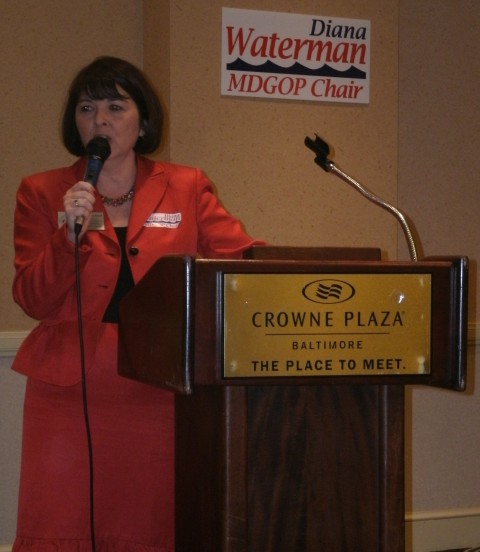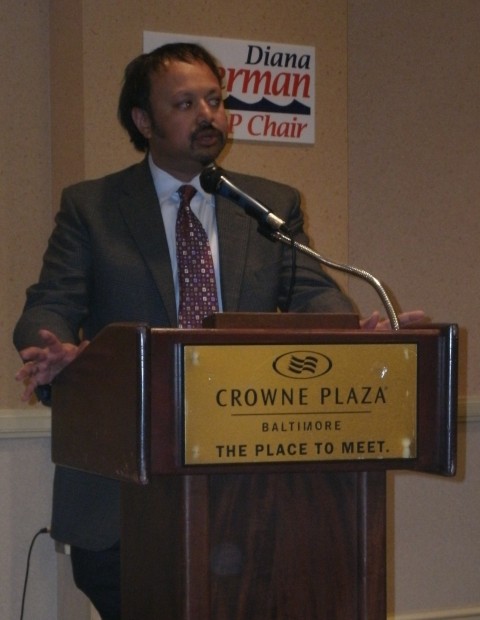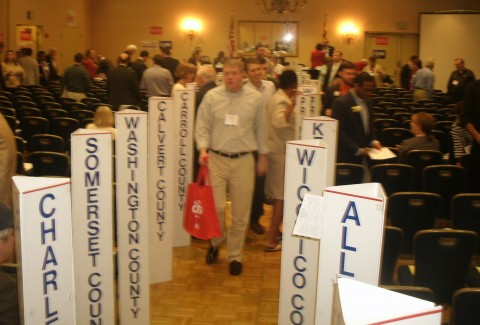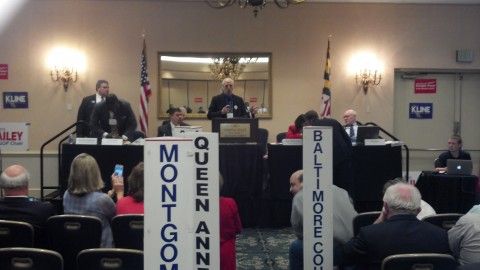
When I last left you in my narrative, I had just gone to bed after several hours of fun and carousing with many people, some of whom had names and faces I sheepishly admit I couldn’t keep straight. But I think I can get all of these right.

My alarm I’d set for 6:30 never went off so I was a little late for breakfast, and regrettably only caught the end of Ken Timmerman’s remarks. He used a Biblical parable to conclude, saying “we are coming from the desert” and in the process of “picking our Moses for 2014.”
“Organize, organize, organize…never, never, never give up!” exhorted Ken.
He was the lead-in for Delegate Neil Parrott, who’s pictured above. His remarks centered on what’s in the future for MDPetitions.com.
Thanks to the passage of Question 5, Maryland now has the “distinct honor” of having the most gerrymandered Congressional districts in the nation, Neil claimed. But in all of the questions, Neil pointed out in his experience that having someone at the polls influenced the results in our favor to some extent. We could have used more poll workers, said Neil.
We also could have used more money to spend as we were well outspent on each issue, particularly Question 6. Proponents also shrewdly changed the message; for example, Question 4 was made to not be about illegals but about kids. And because the petition was done last summer, the “passion wasn’t there” against Question 4 after a one-year lapse while proponents had the money early on to quietly spread their message.
“What we need to do is reinvent ourselves,” said Parrott, claiming we had winning issues but no campaign. In the future – and there were at least a couple bills which would probably require a petition to attempt to overturn coming out of this year’s session – there had to be a four-pronged strategy for victory: get the petitions out, defend them in court, challenge the biased ballot language (Question 5 was a good example of this, said Neil), and run full-fledged campaigns.
A more full-fledged campaign might be more like those on either side of Question 7, as the campaigns for and against expanding gambling spent twice as much on that issue than Bob Ehrlich and Martin O’Malley combined for in their 2010 gubernatorial campaign.
One other item Delegate Parrott touched on was a privacy bill for petition signers, which he’ll reintroduce this session.
While the groups went off into their individual seminars, I wandered around the Turf Valley facility where I found tables for the aforementioned MDPetitions.com and the similar effort to keep the petition process from being made more difficult.


Right behind the MDPetitions table was a large-scale and signed copy of a “no confidence” resolution sponsored by Baltimore County Chair John Fiastro, Jr.

I also peeked into the convention hall where the action would begin after lunch.

Yep, placed in the back again. But this room was well set up for such an event because it was wide but not deep. Eventually my only complaint would be that we needed a second projection screen for our side of the room because the county signposts would be in our line of sight of the one provided.
Others were also skipping the seminars to work out issues, such as the Maryland Young Republicans. From the snippets I overheard, they were working out details of their own upcoming convention June 1st in Montgomery County.

Before we met for the convention we had to be nourished, so lunch featured speaker and “unusual political consultant” Brent Littlefield.

Littlefield focused mainly on running the campaign of Maine Governor Paul LePage in 2010, noting that a political campaign was “not just tactics, but strategy.” He explained how he microtargeted certain blocs of voters to effectively compete in a seven-person primary where his candidate was outspent 21 to 1.
As for 2012, Brent told us the message was lost, but there was still a reason we’re all here – we believe in certain principles. But we have to expand our circle of influence, not just talk to friends.
Brent also related an amusing Twitter incident he helped to bring about involving Martin O’Malley and his trip to Maine, leading O’Malley to call Maine Gov. Paul LePage a governor who “worship(s) the false idol of tax cuts.” It was great because he took the fight directly to the enemy, infiltrating their own Twitter feed.
It’s worth exploring as well that the Pledge of Allegiance at lunch was led by two-time Congressional hopeful Frank Mirabile. By itself it’s not newsworthy, but Frank took advantage of Alex Mooney’s invitation for further remarks to note the average age in the room was “well above what we need to be” and that we had to break out of our comfort zone. Obviously he had to do so to campaign in portions of his district.
That snippet brings me back to the Maryland Liberty PAC suite and the younger people I saw there. The convention hall could have used some of those younger folks with energy – as one example, I’m 48 and I’m one of the younger members of our Central Committee. Let’s not drive the youth away.
I’ll step off my soapbox now, since this point in the narrative is where the convention fun begins. And like the Executive Committee meeting the previous night, it began with a special guest.

“It’s good to be around friends for once,” said Dan Bongino. But he wanted to take a few minutes to thank us for our support and ask how we can fix this moving forward. “We can win this,” Bongino concluded.
But to win it will probably take a little more money than party Treasurer Chris Rosenthal said we had. And while we had whittled down our line of credit significantly during the fourth quarter of this year, Chris told us “we’re not out of the weeds.” This year will feature a “tight, but conservative” budget for party operations.
Chair Alex Mooney was pleased to see the full workshops, but again cautioned in his report that this meeting could be a long one. We have “things to discuss and air out,” said Alex. He related the story of the bitter RNC meeting he attended where several new officers were elected, a process which took multiple ballots for each. Yet at meeting’s end, there were no “bad sports.”
“If you don’t intend to walk out after this meeting and fight the Democrats, then walk out now,” said Alex. I didn’t see anyone leave so I guess we can turn our guns in the right direction – outward.
As Alex said, there is reason for optimism going forward. And it seemed like he understood that the petition process needs to be followed through on, saying that getting them to the ballot was one success but we need to “take the next step.”
We then had a presentation from party Executive Director David Ferguson on the goals established for this year: financial stability, a modern political infrastructure, successful petitions, and planning for 2014. Something about that presentation I found interesting: of the petition signers for each question, only 59% of those opposing in-state tuition for illegal aliens, 72% of those who opposed the gerrymandered Congressional districts, and 52% who signed the petition against gay marriage were Republicans. Questions 4 and 6 had fairly bipartisan opposition, at least at the petitioning stage. We can build on that.
But now, said Ferguson, “our job is to take out every Democrat in ‘red’ counties.” As I look at that task, it means we work on solidifying the 18 that support us now and start to erode our advantage in the five which most heavily vote against their self-interest as time goes on.
He also announced a new program in the works based on the national “Young Guns” program. It will be tailored not just to candidates, though, but to Republican organizations as well. “Our money should go back to your candidates,” concluded Ferguson.

The legislative reports on the Senate and House, respectively, were given by Senator E.J. Pipkin (above) and Delegate Tony O’Donnell (below).

Pipkin was proud to address the “irate, tireless minority,” and took advantage of our attention to once again call Martin O’Malley the “2 billion dollar man.” That’s how much working Maryland families pay extra each year thanks to the tax increases O’Malley and Democrats in the General Assembly passed over GOP objections. And while Republicans put together a balanced budget each year – one which doesn’t require any tax increases at all – it’s ignored by the majority party. They “won’t stop digging the hole,” said Pipkin. Instead, they want to raise the gas tax – not to fix roads like they might claim, but because $4 billion has been promised to expand the Red Line and Purple Line.
“We provide a different vision for Maryland,” explained Pipkin, one which provides a state where you want to live and not a state you want to leave.
Tony O’Donnell started out his remarks with a movie review – go see “Lincoln.” It made him proud to be a member of the Republican Party. After seeing the infighting end in an effort to pass the Thirteenth Amendment (over Democratic opposition, he slyly added) he realized once again that “Maryland is worth continuing to fight for.”
Tony alluded to his own Congressional campaign, pointing out he had received 95,000 votes and that was the highest vote total for a Fifth District Republican since Larry Hogan in 1992. O’Donnell believed that “we can go to 50 seats (in the House of Delegates) – we can go to 60 seats.” One mistake from 2010 he didn’t want to repeat was having to recruit candidates in the summer before the election. It was a team effort to find 141 House of Delegates hopefuls, but we had to “let no seat go unchallenged.” (In the 2010 election, Democrats got a free pass for 34 seats – almost half of what they needed for the majority.)
Nicolee Ambrose spoke in her first National Committeewoman’s report about the Super Saturday program and lessons we could draw from it. While it had its successes, we needed to rebuild our campaign infrastructure and focus on targeted voter contacts with a eye toward long-term outreach as well.
For 2013 she suggested the Super Saturday concept work more toward voter registration. Other projects on her wish list was IT training for local party leaders (something the RNC is willing to do) and ramping up a grassroots committee which Faith Loudon had volunteered to head up.
Louis Pope was far more blunt and expanded on his “painful” theme from the evening before by revealing some of our losses: Obama won single women by a 67-31 count, Hispanics 71-28, blacks 93-5, and Asians 73-22. He also garnered 60% of the under-30 vote and a majority of those who made under $50,000. Obama “changed some of the issues on us,” said Pope. Instead of the jobs and economy, it became the (so-called) ‘War on Women.’
“We’ve reached a turning point,” said Pope, who believed the one silver lining we had was that we’ve “reached the bottom.”
After all these external political reports were concluded – a process which took nearly two hours – we then turned to several internal committee reports. For the first time in several conventions, though, we had no prospective bylaw changes so the newly created Bylaws Committee could simply note that fact and alert us at the county level that some possible revisions may come at us next spring.
Similarly, the Nominations Committee had no report. So it was up to the Resolutions Committee to provide the day’s final drama.
Interestingly enough, the order Resolutions Chair Andi Morony presented these in was supposed to be least to most controversial, but the very first resolution presented by Cecil County Chair Chris Zeauskas drew heavy debate. This was a resolution condemning newly elected Cecil County Executive Tari Moore for changing to unaffiliated status; a resolution which contended, among other things, that her election “was obtained through deception and false pretenses.”
And while proponents of the resolution – not just in Cecil County, but in other Republican circles – believed Tari Moore had “sold out” Cecil County Republicans, there were those who noted her principles hadn’t changed but the stalemate which exists between her and some of the four remaining members of the Cecil County Council (all Republicans) could only be broken and her agenda implemented if she was allowed to select her own replacement. Meanwhile, this was described in one media report as a proxy battle between Republicans E.J. Pipkin and Andy Harris, with Pipkin in favor of demanding Moore resign and Harris confident of her return to the GOP fold after her replacement is selected.
Once several had spoken on both sides, a motion was made to table the resolution. With our weighted voting system and the fact I couldn’t tally the vote as it was going, I can’t give you the split in actual bodies but the motion to table passed by a 285-230 voting margin. Thus, the resolution was killed for this convention, although it could theoretically return in the spring.
After careful consideration, I voted to table the resolution; however, our county split 6-3 in favor of tabling. The reason I decided to do so was figuring that she was trying to stand by both conservative principles and trying to better Cecil County. There’s little chance a Democrat or liberal would be put into office, but if she does select one I would be more inclined to support a similar resolution in the spring. Call it a “wait and see” approach for yet another item which could divide the overall party over a county issue.
Resolutions two and three were both very easy to pass and worthwhile to do so. The second introduced condemned the passage of Senate Bill 236 and its resultant attack on property rights, while the third was a Resolution of Commendation for Carroll County Commissioner Richard Rothschild and his battle against the UN’s Agenda 21. Both were introduced by Scott DeLong of Harford County and both passed by unanimous voice vote.
The final resolution was the one I showed the mockup of earlier; authored by Baltimore County Chair John Fiastro Jr., it advised our three Republican National Committee members to oppose the re-election of RNC Chair Reince Priebus.
That also drew a lot of debate on both sides, but in watching those on the “anti” side line up it was apparent that not enough people were willing to rock the boat. The resolution ended up failing by a 223-286 count.
Yet Wicomico County was one which unanimously supported the amendment. While others had their own reasons and I was advised by a few people that there was a hidden agenda at work, my take on this was that I knew it was utterly symbolic at best. Opponents argued that having the Chairman mad at Maryland could hinder the state in getting national funds, but right now we pretty much get along without them anyway. If Reince Priebus doesn’t understand there are legitimate reasons we and others are unhappy with him and can’t put on his big boy pants and deal with them, well, then there’s not much hope he would be a successful Chair come 2014 either.
The dual themes of our convention were a look back at what really happened in the 2012 election and what we can do to improve our lot in 2014. To a significant number of us in the Maryland GOP, that soul-searching has to occur at a national level as well – after all, when Mike Duncan ran again for RNC Chair after the 2008 blowout we suffered there was no shortage of people calling for his head and he withdrew after just a couple ballots. So why the rush to bring back Priebus after failing to defeat the worst incumbent since Jimmy Carter, losing two Senate seats to shrink our minority to 45, and eight House seats including one here in Maryland?
But with the defeat of that resolution, our Fall Convention was over. And it made me realize a few other things are over as well.
The time for playing games is over.
The time for accepting the status quo and “this is how we’ve always done it” is long past over.
It’s time to go to war. If the Democrats think we’ve put on a “war on women,” well, let’s actually give them a war. I call it the “war on voting against one’s self-interest” (yes, a little wordy but it will have to do) and it starts today.








